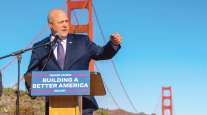Staff Reporter
New Orleans Mayor Mitch Landrieu Calls Mayors to Action on Infrastructure

WASHINGTON — Mayors must take the lead if they hope to improve their cities’ infrastructure, with the help of federal partners, New Orleans Mayor Mitch Landrieu said.
Infrastructure funding is important because metropolitan populations will grow by 24% over the next 30 years, placing more strain on roads and bridges, Landrieu added.
He issued the call to action at the U.S. Conference of Mayors’ winter meeting here Jan. 24.
The group’s gathering came a week before President Donald Trump was to unveil his long-awaited infrastructure plan.
“You can’t rebuild roads without the mayors of America. Identifying the problem without proposing a solution is no solution at all,” said Landrieu, who also is the conference president. “Here is where we’re inextricably linked to leaders in Washington. We will not rebuild our country’s infrastructure unless cities lead the way. Mayors must have a true partner in Washington, D.C. Mayors must lead the way.”
According to Landrieu, the United States faces a $4.6 trillion infrastructure deficit that makes the country uncompetitive with other nations.
“The president correctly said America is getting beaten around the world by not having infrastructure that works,” Landrieu said. “Americans right now see chaos and confusion coming from Washington, D.C., and it causes anxiety. Mayors are forced with no choice but to govern, and we have to govern in real time. Go big or go home.”
"The emperor wears no clothes when it comes to his plan"-@ChicagosMayor is skeptical about Trump's #infrastructure plan @usmayors pic.twitter.com/sPLzGkrKGF — Eleanor Lamb (@eleanorannlamb) January 24, 2018
At a meeting Jan. 24 with some mayors, Trump said the plan will be released shortly after his State of the Union address and probably will create an investment slightly larger than the initial $1 trillion projection. “We’re also working to rebuild our crumbling infrastructure by stimulating a $1 trillion investment, and that will actually, probably, end up being about $1.7 trillion,” Trump said at the meeting. “We’ll probably be putting that in a week or two, right after the State of the Union address.”
All of the mayors were expecting to meet with the president, but many boycotted after the Department of Justice on Jan. 24 increased pressure on “sanctuary cities” seeking public safety grant money, warning that they could be legally forced to prove they are cooperating with federal immigration authorities.
Trump had been touting a 10-year, $1 trillion infrastructure plan, explaining that $200 billion would come from existing federal accounts, while the remaining $800 billion will come from private-sector investments.
Chicago Mayor Rahm Emanuel flatly said that the infrastructure plan does not supply enough funds for states hoping to conduct infrastructure projects. Emanuel, who previously was chief of staff for former President Barack Obama, expressed skepticism that the upcoming plan will be effective.
“Two hundred billion, for a trillion-dollar goal, is fairy dust. The emperor wears no clothes when it comes to his plan,” Emanuel said.” He and Landrieu were among mayors to boycott meeting with Trump.

Scott
Landrieu said that, more than anything, he hopes the infrastructure plan is functional and works for cities and local jurisdictions. He said the nation’s roads, bridges and airports need a lot of help and that mayors are eager to engage with White House officials on this issue.
Sen. Tim Scott (R-S.C) underscored the importance of infrastructure, saying that states need sufficient funds to support their systems.
“In order for us to deal with infrastructure needs around the country, we’re going to need more money than we’ve ever had,” he said, noting that it took him 33 minutes to get some 3 miles from his office to meeting site. “When I was a younger man, I could have run that,” he quipped.


